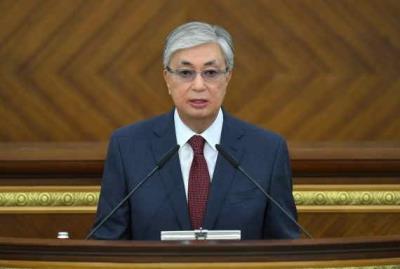Kazakh President Calls For Deeper Regional Cooperation At UN Conference
In his address at the Third UN Conference on LLDCs, Tokayev said that LLDCs, home to over 500 million people across various continents, face major, persistent obstacles including limited access to finance, global markets, and regional transport, as well as increasing exposure to geopolitical tensions and severe supply chain disruptions.
"These constraints add poverty and limit competitiveness," he said, urging deeper regional cooperation and stronger global representation of LLDCs at international forums and within multilateral institutions.
He called for innovative financing mechanisms and robust political will from both transit countries and international development institutions to boost investment in transport, renewable energy, and digital sectors, Xinhua news agency reported.
The Kazakh President also highlighted pressing climate change issues, including water scarcity, glacier loss, and rapid desertification, underlining his country's significant effort in improving regional connectivity through building critical transit corridors across Central Asia.
"Central Asia is moving from being landlocked to landlinked," he said, calling for broader regional cooperation and multilateral action to turn geographic challenges into meaningful opportunities for long-term prosperity.
Landlocked Developing Countries (LLDCs) are locked out: with no direct territorial access to the sea, they consistently struggle with international trade, connectivity, and overall economic development at both the national and regional levels.
Cut off from the global marketplace and without the means to develop adequate transport and logistics infrastructure, landlocked developing countries are facing unique and significant challenges in achieving the Sustainable Development Goals outlined by the international community.
The Third UN Conference on Landlocked Developing Countries opened an important opportunity to explore meaningful partnerships, collaborations, and coordinated efforts to unlock the untapped potential of landlocked developing countries.
Innovative solutions, strategic partnerships, and increased foreign investment can help to address these multifaceted challenges and unlock the full economic and human potential of the participating nations, enabling more inclusive and resilient growth trajectories.
-IANS
int/bpd/vd

Legal Disclaimer:
MENAFN provides the
information “as is” without warranty of any kind. We do not accept
any responsibility or liability for the accuracy, content, images,
videos, licenses, completeness, legality, or reliability of the information
contained in this article. If you have any complaints or copyright
issues related to this article, kindly contact the provider above.
Most popular stories
Market Research

- Betfury Is At SBC Summit Lisbon 2025: Affiliate Growth In Focus
- Xfunded Expands In Dubai, Strengthening Collaborations With Trading Influencers Across Europe
- Motif AI Enters Phase Two Of Its Growth Cycle
- Utila Triples Valuation In Six Months As Stablecoin Infrastructure Demand Triggers $22M Extension Round
- Red Lions Capital And Neovision Launch DIP.Market Following ADGM Regulatory Notification
- Origin Summit Unveils Second Wave Of Global Icons Ahead Of Debut During KBW





















Comments
No comment